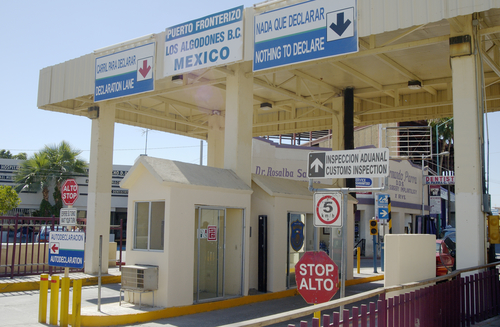ACLU suit challenges warrantless searches of electronic devices at border

View of Algodones, Mexico from the U.S. side of the port of entry. Jim Parkin / Shutterstock.com
A lawsuit filed Wednesday challenges warrantless searches of smartphones, laptops and other electronic devices at the border.
The American Civil Liberties Union and the Electronic Frontier Foundation filed the suit in Boston federal court on behalf of 11 travelers whose electronic devices were searched without a warrant, according to a press release. The New York Times and the Wall Street Journal (sub. req.) have stories.
The lawsuit (PDF) contends border searches of electronic devices violate the First and Fourth Amendments absent a warrant and probable cause that the devices have data indicating a traveler has broken an immigration or customs law. The plaintiffs include journalists, students, a limousine driver, business owner, professor, engineer, filmmaker, computer programmer and artist.
“Searching personal electronic devices without a warrant based on probable cause violates the constitutional rights of individuals to keep the private and expressive details of their lives free from unwarranted government scrutiny,” the suit says. “Defendants’ policies and practices in searching and seizing personal electronic devices at the border eviscerate Americans’ constitutional rights to privacy and freedom of speech and association.”
The issue has raised concerns for lawyers who fear they could disclose confidential client information if their electronic devices are searched when returning to the country. Panelists at the ABA Annual Meeting in August said case law is murky on whether border officials can do more than a cursory search without probable cause, but lawyers may want to use burner phones and laptops without client data when traveling outside the country to avoid disclosure.
The federal government contends such searches are allowed under an exception to the warrant requirement that allows searches of suitcases.
The lawsuit cites a 2014 U.S. Supreme Court decision, Riley v. California, which held police generally can’t search the contents of a cellphone seized during an arrest, unless they get a warrant.
Border searches of electronic devices typically occur in a special screening area, an environment that is inherently coercive, according to the lawsuit. Border officers often use that environment, along with the threat of confiscating devices, to compel travelers to unlock devices or disclose passwords, the suit says.
One plaintiff, the filmmaker, was restrained while an agent took his phone, the suit says. Four others had their devices seized.
The case is Alasaad v. Duke.
Write a letter to the editor, share a story tip or update, or report an error.


